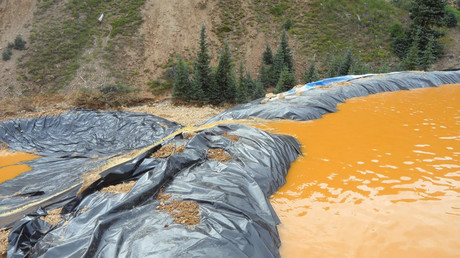Investigation launched after Russian river turns red
Mina Abgoon
12:29 AM, Sep 8, 2016
1 hour ago
Copyright 2016 Scripps Media, Inc. All rights reserved. This material may not be published, broadcast, rewritten, or redistributed.
Authorities are investigating the reason behind a stunning, yet alarming sight in Russia.
Daldykan River located by the Arctic town of Norilsk turned bright red Tuesday, prompting confused residents to share photos online.
Why has Russia’s Daldykan River turned blood red? https://t.co/nZqRMvmZkP— Atlas Obscura (@atlasobscura) September 7, 2016
#russianriver mysteriously turns #blood #red #Daldykan #River near #norilsk in #Siberia lost its natural color pic.twitter.com/7L2ao3ZLGz — sudhakar (@naidusudhakar) September 8, 2016
The Daldykan River near the city of Norilsk (Russia). "Water turned to blood." pic.twitter.com/KNskDQa9An— Max Vanderpool (@MaxVanderpool) September 8, 2016
While the cause is still unknown, authorities are evaluating possible environmental damages, such as discharge from "an unidentified chemical" from the nearby Nadezhda Metallurgical Plant,” CNN reports, citing a statement by Russia's Ministry of Natural Resources and Environment.
Nadezhda Metallurgical Plant is reportedly owned by Norilsk Nickel, the world's largest nickel producer.
So far the company has denied that its plant is to blame for the reddened river.
Norilsk is known for its heavy pollution and is considered one of the most polluted cities on earth.
==========
Plagues of Siberia: Russian Arctic river mysteriously turns blood-red

A river outside Russia’s Arctic city of Norilsk has inexplicably
turned blood-red, puzzling locals and prompting authorities to launch
an investigation into the cause of the anomaly.
Russia’s Ministry of Natural Resources and Ecology confirmed that it had received reports of river pollution “with an unidentified chemical substance,” saying there could have been an accident at the Norilsk Nickel plant, the world’s largest producer of nickel and palladium.
The plant’s administration denied these allegations, however, RIA Novosti news agency reports.
“As of today, the polar division of the [Norilsk Nickel] company cannot confirm any leakage or accidental discharge of industrial waste into the Daldykan River, which could have affected the river’s state,” the company said in a press release.
Nonetheless, it has been decided that the plant will temporarily lower its operational capacity and monitor the state of the environment around the facility and in the affected area of the river. The company also provided an aerial photo said to be shot on the same day and showing the water was of regular color.

Surprisingly, the plant’s press service told the news agency that the river’s color right now is actually its natural one.
A state of emergency has not been declared, according to Norilsk mayor’s office, as the river does not contribute to the city’s water supply.
Locals have been more inquisitive, however, and have enthusiastically suggested reasons for the color change, with some asking whether a new episode of The Crimson Rivers was being filmed in the area, while others have suggested that it’s high time to go fishing, as all of the fish could now pass for salmon.
Others blame the mining plant, which locals call by the female name Nadezhda (Russian for Hope), saying it is having its time of the month.
Some noted that it’s not the first time they have come across such a strange phenomenon, saying that this effect occurs when the river washes out subsurface rock formations, which mostly consist of nickel and copper.
Image distributed by Norilsk Nickel on Wednesday


